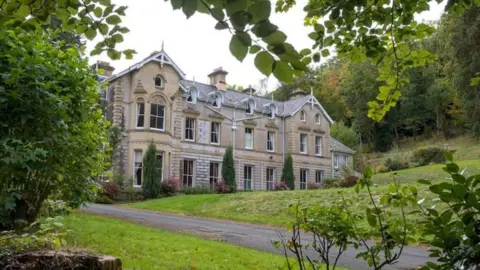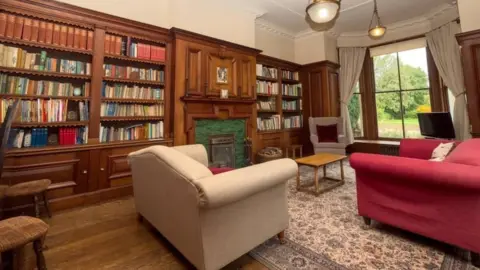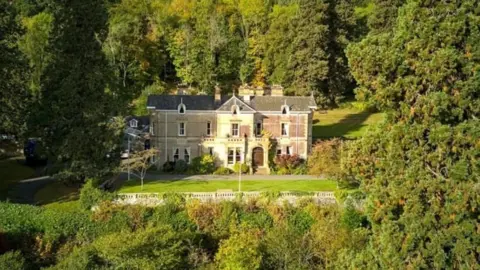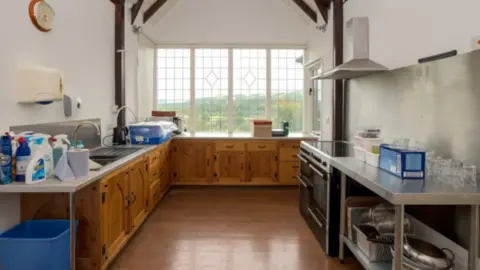Powys tycoon's former mansion on the market for £3m
 McCartneys
McCartneysA mansion that was home to a Welsh coal and rail tycoon is on the property market for the first time.
Grade-II listed Broneirion was built by David Davies in his home village of Llandinam, Powys, in 1864.
The property has been used by Girlguiding Cymru as a holiday and training base since the 1940s.
But now the 20-bedroom home, complete with around 10 acres of land, could be yours - for £3m.
Born in 1818, Mr Davies had humble beginnings as the son of a farmer and sawyer.
He went on to grow an empire which stretched into Europe and North America, but local historian Nia Griffiths said his heart remained in Llandinam.
 McCartneys
McCartneys"The house wasn't situated by accident," Ms Griffiths explained.
"It was planned so that from his terrace he could see some of his first achievements: the 90m steel bridge over the Severn, the chapel he built for the village, the little house on the hill opposite where he was born, and the local railway station, part of the Llanidloes and Newtown line which he founded in 1859".
The steel bridge over the northern section of the River Severn gave Mr Davies his first break - one which he would soon capitalise on.
"The Llandinam bridge was a relatively local project - one which a small businessman like Davies could compete for - but after it became such a success it opened the way for him to tender for far bigger ventures", Ms Griffiths said.
Mr Davies went on to conceive and arrange seven of mid Wales' railways - including most of the tracks you would travel on to this day.
But his biggest gamble came with his venture into coal in the 1860s, when he nearly lost everything.
He rented some land in the Rhondda Fawr and started searching for a workable seam. For 15 months his men dug into the ground - but to no avail.
After weeks of non-payment the miners went on strike, upon which Mr Davies is said to have thrown his last half-crown into the crowd, proclaiming: "Have that as well. Just give me another week".
On the seventh day of unpaid work, on a piece of land in Ton Pentre, Mr Davies' men found a massive seam of the best-quality steam coal.
 McCartneys
McCartneysMr Davies' empire grew and the expansion of the coal industry continued apace until there were mines in 16 valleys across the south Wales coalfield.
He threw his weight behind efforts to establish Barry as an alternative port out of south Wales, funding a trainline from his pits to the Vale of Glamorgan, and in the process transforming a quiet fishing village into one of the busiest docks in the world.
Mr Davies died in 1890, but his descendants lived in Broneirion for many decades until it was gifted to the girl guides in 1946.
 McCartneys
McCartneysNia Griffiths' mother was one of the girls who benefited from the experience at Broneirion, which was used as a training centre.
"My mother, Brenda, went there during the 1950s", said Ms Griffiths.
"They learnt how to cook, and camp, and take care of themselves. It was massively empowering in a world which was still clinging on to the idea that you needed men to do everything for you."
After decades of using the property on loan, Girlguiding Cymru bought it outright in 1992 for £510,000.
Bev Martin, chief commissioner of Girlguiding Cymru, said: "I'm sure that many people will have such happy memories of Broneirion, but after decades of subsidising it to the tune of tens of thousands a year, we had to draw the line somewhere."
Even before Covid, numbers at Broneirion's residential courses had started to decline.
"We're not in financial hardship, but we had to take tough decisions to make sure that remains the case", Ms Martin said.
She explained that should the property reach anything like its asking price, then the possibilities for Girlguiding members would be vastly improved in the future.
"With millions of pounds in the bank, the opportunities we can offer can only grow. We have to adapt and stay relevant to young girls at a time when there's increasing demands on their time and attention."
Tom Carter, a partner at McCartney's estate agents which has been tasked with selling the property, said: "I've never sold anything quite like this before. As much as the monetary price of bricks and mortar, the true value is in the provenance and history.
"As a Grade-II listed building, the most important thing to say is that, whatever happens, it won't be knocked down or messed around with. I hope that it would be returned to a family dwelling, but that's unlikely, so possibly a wedding venue, hotel, or maybe even flats."

- A SPECIAL SCHOOL: Behind the scenes at a school like no other
- ICONIC WELSH PEOPLE, PLACES AND THINGS: Kiri Pritchard-McLean unearths the best clips from the BBC Wales archive

